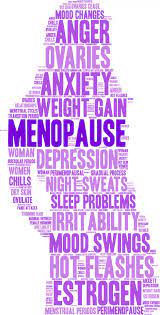By: Melissa Hartman, MS, ATC, ACSM-EP
In today’s frenetic world, stress feels like a constant unwelcome companion. It lurks in overflowing inboxes, explodes from to-do lists a mile long, and vibrates with every notification that steals our focus. Companies are starting to recognize this stress epidemic, throwing everything from the calming sounds of the Calm app to the mindful practices of eMindful at their employees. Some even offer the cathartic release of scream rooms or the restorative power of nap pods! But for women in the throes of perimenopause or menopause, stress management isn’t just another trendy buzzword – it’s a transformative tool waiting to be wielded. Buckle up, ladies, because we’re about to embark on a scientific exploration that reveals why mastering stress during this pivotal life transition is the key to unlocking a powerhouse of well-being you never knew existed.

Here’s why: stress and weight gain are more connected than you might think. We all know the frustration of those extra 10-15 pounds that tend to settle around our midsection during this time. But beyond aesthetics, this belly fat carries a significant health risk – an increased chance of developing diabetes and heart disease.
The culprit behind this connection is a hormone called cortisol. When we’re constantly stressed, our bodies go into “fight-or-flight” mode, and cortisol levels surge. This hormone triggers the release of glucose (sugar) into the bloodstream to provide us with a burst of energy. Imagine hitting the gas pedal in your car.
However, in our daily lives, we’re often not actively “burning” this extra sugar. We’re driving, working at our desks, waiting in line – activities that don’t require significant energy expenditure. Instead of using this glucose, our bodies need to store it somewhere safe. The ideal location for quick access is close to the liver: the abdomen.
Insulin, another key player, helps move sugar out of the bloodstream and into our muscles and liver for storage. Estrogen, a hormone that naturally declines during perimenopause and menopause, actually amplifies insulin’s effect.
Throughout our lives, this process keeps our blood sugar levels in check. However, with declining estrogen levels, insulin becomes less efficient at its job, making it easier for the body to store excess sugar as abdominal fat.
So, what can we do about it? We need to not only take our foot off the gas pedal (stress) but also actively press the brakes (stress management techniques). Simply relaxing with mindless activities like scrolling through social media only takes our foot off the gas. To truly hit the brakes, we need to activate the parasympathetic nervous system, which promotes relaxation, digestion, and rest.
Dr. Stacy Sims, a renowned expert in women’s physiology, emphasizes the importance of the parasympathetic nervous system during this life stage. She highlights the vagus nerve, a key component of this system, as a powerful tool for managing stress. When stimulated, the vagus nerve helps slow the heart rate, promoting relaxation. Deep breathing exercises are a powerful way to stimulate the vagus nerve – it’s more than just resting or sleeping!
The good news is there are numerous stress management techniques to explore, from quick one-minute practices to longer, dedicated sessions. And if you don’t like one method, there’s always another! Here are a few examples to get you started (and remember, there are many more options out there):
- Deep breathing: Take slow, deep breaths, focusing on filling your belly rather than your chest. Hold for a few seconds and slowly exhale.
- Meditation: Many free guided meditations are available online or through apps. Even a few minutes a day can significantly reduce stress.
- Mindfulness exercises: Practice being present in the moment. Focus on your senses – what can you see, hear, smell, taste, or touch?
- Progressive muscle relaxation: Tense and release different muscle groups in your body, starting with your toes and working your way up.
- Yoga or gentle stretching: Physical movement can be a great way to de-stress and improve relaxation.
Progressive relaxation
Guided imagery
Autogenic
Mindfulness
By incorporating stress management techniques into your daily routine, you’ll be taking control of your cortisol levels and promoting a healthier, more balanced metabolism. Remember, ladies, you are not alone in this journey. With a little science-backed knowledge and stress-busting techniques, you can navigate perimenopause and menopause feeling empowered and in charge of your well-being.
If you are interested in health coaching for stress management, click HERE!
To read a sciency article on this topic, click HERE!

